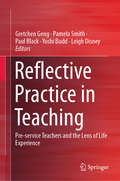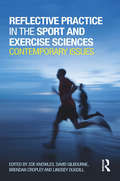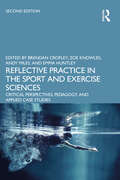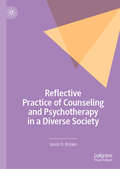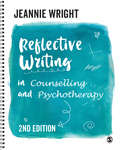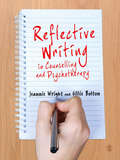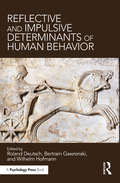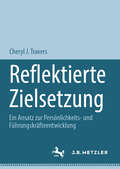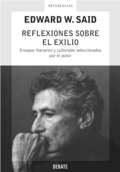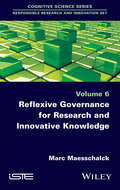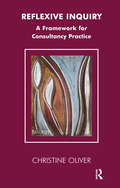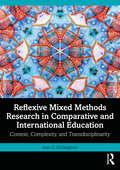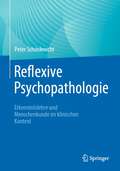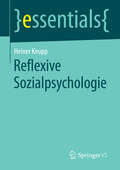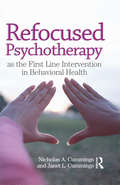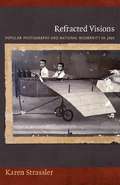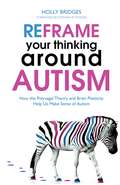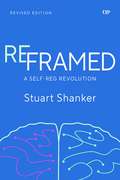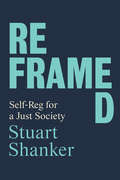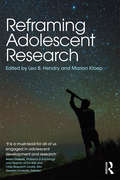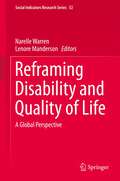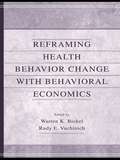- Table View
- List View
Reflective Practice in Teaching: Pre-service Teachers and the Lens of Life Experience (Reflective Teaching Ser.)
by Gretchen Geng Pamela Smith Paul Black Yoshi Budd Leigh DisneyThis book investigates the ways in which pre-service teachers develop and articulate their professional knowledge by presenting their reflections on contemporary issues and topics they have explored during their own teaching practicums. It uses reflective practice to connect pre-service teachers’ personal backgrounds with their placement experience concerning a self-selected topic, including teacher educators’ reflections on the pre-service teachers’ reports on these placement topics. By illustrating the broad range of issues encountered by pre-service teachers, sharing multiple perspectives on the complexity of classroom practice, and demonstrating the importance of reflective practice, it also provides a valuable mentoring framework. Moreover, the book studies how examining pre-service teachers’ life experience can facilitate in-depth understanding, specifically in the context of pre-service teachers’ reflections on their own practices in different educational settings. In short, the book helps current and prospective pre-service teachers and teacher educators get to know their students and themselves better using reflective practice.
Reflective Practice in the Sport and Exercise Sciences: Contemporary issues
by Zoe Knowles David Gilbourne Brendan Cropley Lindsey DugdillDrawing on the experiences of scientists, researchers, practitioners and teachers in a wide range of sport and exercise settings, this book explores contemporary issues in reflective practice and considers the way that reflective practice impacts upon applied practice, on research methodology and on professional development. It includes chapters on the use of reflective practice in areas as diverse as: delivering coach education sport psychology support working in sports physiology developing young players in sport exercise-related interventions physiotherapy working inside a professional football club student skills and the physical activity and health curriculum Based on multi-disciplinary work in education and the health sciences, and exploring the crucial interface between learning and practice, this book is important reading for all sport and exercise scientists and any professional working in sport and exercise looking to become more effective practitioners.
Reflective Practice in the Sport and Exercise Sciences: Critical Perspectives, Pedagogy, and Applied Case Studies
by Zoe Knowles Brendan Cropley Andy Miles Emma HuntleyWithin the Sport and Exercise Sciences (SES) and allied disciplines, reflective practice has become firmly established as a fundamental aspect of education, professional training and development, and applied service delivery. This has resulted in an emerging, context-specific evidence base that has attempted to make sense of the application and utility of reflective practice as a mechanism to facilitate personal and professional growth through experiential learning, and subsequently develop the knowledge required to navigate the complexities of applied practice. This new and fully revised edition of Reflective Practice in the Sport and Exercise Sciences explores the contemporary conceptual landscape, critical perspectives, pedagogy, and applied considerations in reflective practice in the SES and allied disciplines. Contributions from scientists, researchers, practitioners, and academics offer innovative perspectives of reflective practice, founded on a synthesis of the contemporary empirical evidence base and applied practitioner experience. These contributions challenge academic and/or practice-based audiences regarding the utility, research, and representation of reflective practice, while offering critical insights into the application of different approaches to reflective practice. Based on exploring the crucial interface between learning and practice, this book is important reading for all who work in the SES and allied disciplines, and, more widely, any professional aiming to become a more effective practitioner. This book is endorsed by the British Association of Sport and Exercise Sciences.
Reflective Practice of Counseling and Psychotherapy in a Diverse Society
by Jason D. BrownThis book is a guide to critical reflective practice that highlights cultural differences and their impact on the therapeutic relationship. It is designed for therapists in training as well as more experienced practitioners. The book addresses important topics such as power and privilege in relation to class and race, gender and sex, (dis)ability and age. Readers are encouraged to respond to questions about their values and beliefs, worldviews and ideologies, and assumptions about theories of change, as well as their own heath and healing process.
Reflective Thinking in Educational Settings
by Alessandro Antonietti Emanuela Confalonieri Antonella Marchetti Alessandro Antonietti Emanuela ConfalonieriThis volume examines the role that culture plays in the acquisition of cognitive, linguistic, and social skills. Taking reflective thinking as a central analytical concept, the contributors investigate the role of personal reflection in a series of mental activities, including the creation of social relationships, the creation of a mental narrative to make sense of events, and metacognition. These three types of cognition are usually conceived of as separate research fields. Metarepresentation and Narrative in Educational Settings draws these discrete subfields into dialogue, exploring the connections and interplay among them. This approach yields insight into a range of topics, including language acquisition, cognitive processes, Theory of Mind, cross-cultural interaction, and social development. The volume also outlines the implications of these findings in terms of further research and possible social policy initiatives.
Reflective Writing in Counselling and Psychotherapy
by Jeannie WrightIn this book Jeannie Wright takes readers on a journey from how to start writing, through the various approaches, on to how to deal with obstacles, and how to maintain reflective enquiry as a professional habit. Reflective writing exercises, case studies and ideas for self-directed learning will help readers practice and apply their skills. This second edition includes more content on: the new Ethical Framework technological developments impacting counselling diversity and difference in the therapeutic relationship This book is an essential how-to guide for trainees and practitioners that provides them with all the tools they need to develop writing for reflective practice.
Reflective Writing in Counselling and Psychotherapy
by Jeannie WrightIn this book Jeannie Wright takes readers on a journey from how to start writing, through the various approaches, on to how to deal with obstacles, and how to maintain reflective enquiry as a professional habit. Reflective writing exercises, case studies and ideas for self-directed learning will help readers practice and apply their skills. This second edition includes more content on: the new Ethical Framework technological developments impacting counselling diversity and difference in the therapeutic relationship This book is an essential how-to guide for trainees and practitioners that provides them with all the tools they need to develop writing for reflective practice.
Reflective Writing in Counselling and Psychotherapy: Writing And Professional Development
by Gillie E Bolton Jeannie WrightHave you been asked to keep a personal development portfolio or reflective journal? Are you struggling to know where to start, how to write or what to include? If the answer is 'yes', this book will provide you with a straightforward route in, telling you all you need to know about writing reflectively for your own personal and professional development. Offering staged exercises, case-studies, examples and ideas for self-directed learning, this book will lead the reader along an exciting journey of written self-awareness, covering: - the background - what exactly is reflective writing and why is it important - the decisions - when and how to start - the practicalities - the essentials of writing reflectively - the stumbling blocks - dealing with obstacles and difficulties - the long haul - maintaining reflective enquiry as a lifelong habit This book is an essential how-to guide appropriate for all undergraduate and postgraduate trainees, whether they are approaching the topic from a psychodynamic, person-centred or CBT perspective. It will give trainees all the tools they need to become mature reflective practitioners. Jeannie Wright Director of Counselling and Psychotherapy Programmes at Warwick University. Gillie Bolton is a Freelance consultant in therapeutic & reflective practice writing and author of the bestselling Reflective Writing, 3rd Edition, SAGE 2010.
Reflective and Impulsive Determinants of Human Behavior
by Bertram Gawronski Wilhelm Hofmann Roland DeutschConflicts between the "head" and the "heart" are very common in everyday life. Over the past decade, research on such self-regulatory conflicts has been strongly shaped by Strack and Deutsch’s 2004 Reflective-Impulsive Model (RIM). The award-winning theory integrates cognitive, affective, and motivational influences on overt behavior, offering a domain-independent framework that is applicable to wide range of social and non-social phenomena. This book provides a state-of-the-art overview of research under the framework of the RIM. Its 15 chapters provide an overview of basic principles of behavior determination, showcase the RIM’s integrative and predictive power in many cross-cutting areas of inquiry, and illustrate the value of the theory for understanding the fundamental role of reflective and impulsive processes in various applied domains. Expanding on an introduction that discusses the significance of the RIM from a historical view, the book is divided into three major sections. The first section covers basic psychological principles within the RIM, including selective accessibility, embodiment, associative and propositional operations, and implementation intentions. The second section reviews the integrative and predictive power of the RIM in many cross-cutting areas of inquiry, including intuition, attitudes, self-control, and personality. Finally, the third section showcases the generative power of the RIM in various applied areas, including research on health behavior, addiction, anxiety, economic behavior, sexual behavior, and aggression. In its entirety, this volume provides an indispensable resource for any scholar interested in the psychological underpinnings of reflective and impulsive behavior in various areas of inquiry.
Reflektierte Zielsetzung: Ein Ansatz zur Persönlichkeits- und Führungskräfteentwicklung
by Cheryl J. TraversDieses Buch präsentiert erstmals einen umfassenden Überblick über das Modell des "Reflective Goal Setting", seinen theoretischen Rahmen und Ursprung sowie seine praktischen Anwendungen für die persönliche Entwicklung, verbesserte Bewältigung und Stressreduktion, akademisches Wachstum und Leistungsfähigkeit sowie Führung. In drei Teile gegliedert, untersucht die Autorin zunächst die besondere Bedeutung der persönlichen Entwicklung, insbesondere der Entwicklung von Soft Skills und zwischenmenschlichen Fähigkeiten. Unter Verwendung von Originalforschung und anschaulichen Fallstudien beschreibt die Autorin den zyklischen Fünf-Schritte-Prozess des "Reflective Goal Setting" in fünf Kapiteln, die Teil 2 des Buches bilden. Teil 3 untersucht die praktischen Anwendungen und Auswirkungen der Verwendung von "Reflective Goal Setting" anhand anschaulicher Fallstudien aus verschiedenen Bereichen, einschließlich Hochschulbildung, beruflicher Entwicklung und Führungskräfteentwicklung. Dieses Werk ist eine wertvolle Ressource für Forscher:innen und Praktiker:innen in den Bereichen Organisations- und Industriepsychologie, Bildung sowie Wirtschaft und Management sein - und für jede/n, der/die an der persönlichen Entwicklung arbeiten möchte.Die Übersetzung wurde mit Hilfe von künstlicher Intelligenz durchgeführt. Eine anschließende menschliche Überarbeitung erfolgte vor allem in Bezug auf den Inhalt.
Reflexiones sobre el exilio: Ensayos literarios y culturales seleccionados por el autor
by Edward W. SaidLa selección definitiva de los ensayos culturales y literarios de Edward W. Said realizada por el propio autor. Este libro reúne ensayos sobre temas culturales y literarios escritos por Edward W. Said a lo largo de tres décadas de intenso trabajo intelectual y político. Vistos en conjunto y con la perspectiva crítica que concede el tiempo, estos textos -seleccionados por el propio autor como compendio de su carrera humanista- nos ofrecen la oportunidad de contemplar la evolución y formación de un combativo profesor, un hombre de palabra y acción, así como el desarrollo de una vocación por el conocimiento del mundo llevada hasta sus últimas consecuencias. De sus reflexiones sobre la cultura popular, que le llevan a calificar a Tarzán de «exiliado permanente» o evocar la figura de la bailarina del vientre Tahia Carioca, al machismo y la tauromaquia de Hemingway, pasando por las diferencias que distinguen ciudades como Alejandría y El Cairo, o sus indispensables capítulos sobre música (Gould, Boulez, Wagner, Beethoven y Bach), el autor de Orientalismo expone en estos artículos su punto de vista inteligente y siempre contrario a la edificación de cánones literarios. Reseña:«El retrato de una vida intelectual ejemplar en la cual rigor y claridad se unen con coraje y compromiso [...] Esta es, con toda seguridad, una de las obras más importantes de la cultura y las humanidades que América ha producido en los últimos años.»Martha C. Nussbaum, The New York Times Book Review
Reflexive Governance for Research and Innovative Knowledge
by Marc MaesschalckThe governance theories that have developed over the past twenty years offer a new framework to consider and examine the collective conditions of a “Responsible Research and Innovation – RRI” linked up with the policy challenges of a society in transition in all its modes of regulation. This book will recall the genesis of the reflexive point of view in the context of the development of the theory of governance. It will then develop the strengths of the model and finally, will show the fruitfulness of its application to the field of the RRI.
Reflexive Inquiry: A Framework for Consultancy Practice (The Systemic Thinking and Practice Series)
by Christine OliverThis book sets out to explain how the reflexive inquiry model can be adapted to research so that consultants can continue to evaluate their work and learn from the process. It draws out some implications of the principles, arguments, models, and tools presented for undertaking research.
Reflexive Mixed Methods Research in Comparative and International Education: Context, Complexity, and Transdisciplinarity
by Joan G. DeJaeghereResponding to both the increase of mixed methods research (MMR) and the lack of dialogue about its philosophical and methodological practices in comparative and international education (CIE) Reflexive Mixed Methods Research in Comparative and International Education: Context, Complexity, and Transdisciplinarity offers readers an overview of different philosophical approaches to mixed methods, as well as the practical processes to engage in MMR with reflexivity.Comparing reflexivity to a kaleidoscope, the author describes how it can be used throughout the research process to engage with different paradigms and methods, as well as to integrate findings and consider emerging interconnections. The book discusses various ways to reflexively adapt designs, methods, and analyses, and integrate findings in MMR to better contextualize knowledge in the field of CIE. It illustrates different approaches to MMR through various case summaries, and each chapter poses reflexive questions for researchers to consider during their research projects. It emphasizes a critical realist approach, particularly for how it involves epistemological pluralism while also offering contingent explanations to educational questions. Through a reflexive approach, the book offers possibilities for conducting better and more epistemically just MMR.This is fascinating reading for both new and more experienced researchers to expand the craft of researching with MM. Interdisciplinary and transdisciplinary teams, as well as sole researchers, will find concrete research practices in the book for employing reflexive MMR to understand complex educational issues.
Reflexive Psychopathologie: Erkenntnislehre und Menschenkunde im klinischen Kontext
by Peter SchönknechtPsychopathologie stellt den Begriffsapparat dar, mit dem Veränderungen, Störungen oder Krankheiten der Psyche erfasst werden können. Das methodische Verständnis von Psychopathologie ist umstritten und variiert in Abhängigkeit davon, ob man psychische Phänomene mit biologischen, psychologischen oder soziologischen Methoden untersucht. Psychopathologie hat die – immer schon begriffliche – Erfassung psychischer Veränderung als solcher zum Ziel und versteht sich nicht als alternative Methode neben den Naturwissenschaften, sondern als Grundlagenwissenschaft psychischer Verfasstheit überhaupt. Ihr Untersuchungsgegenstand erfordert eine Methode, die neben dem Instrument der fachbegrifflichen Erkenntnis auch das Verhältnis der erkennenden Subjekte zu ihrem Gegenstandsbereich einschließt – oder anders ausgedrückt, Psychopathologie kann als Grundlagenwissenschaft erst im Ergebnis ihrer Methodenreflexion wirken. Im ersten Teil dieses Buches werden die zentralen Kategorien der Psychopathologie parallel zu ihrer transzendentalphilosophischen Begründung vorgestellt. Auf diesem Hintergrund lassen sich die Mehrzahl der behaupteten Methodenkonflikte als Dilemmata ausweisen. Am Beispiel des Wahnsyndroms soll der Versuch einer fachbegrifflichen Auflösung der Dilemmata geprüft werden. Im zweiten Teil werden die Erträge der Diskussion um den spezifischen Charakter des Psychischen dargestellt und als zirkulär oder dogmatisch kritisiert. Gleichermaßen sollen die Merkmale gelungener Deutungsversuche untersucht und auf ihre Anschlussfähigkeit hin geprüft werden. Ertragreich erwies sich die Begründung der Psychopathologie als Idee der Bewusstheit einer rationalen Psychologie. Als Kriterien für eine sinnvolle psychopathologische Begriffsbildung wurden die Transparenz für die Trias von Intention, Intension und Extension, die Formen des Umgangs mit Ungewissheit und die Relativität von Verstehensbemühungen herausgearbeitet.
Reflexive Sozialpsychologie: Ambivalenzen Und Potenziale Eines Neuen Altersbildes In Der Flexiblen Arbeitswelt (essentials #8)
by Heiner KeuppDie neue Arbeitswelt ist von zunehmender Unsicherheit geprägt. Diskontinuierliche Beschäftigungsverhältnisse sind weiter auf dem Vormarsch. Für die Beschäftigten in der Wissensökonomie sind damit höhere Freiheitsgrade verbunden, aber auch neue Belastungen - bis hin zum Burnout. Zudem sind Jobnomaden, Freelancer und Zeitarbeitende oft von betrieblicher Gesundheitsförderung ausgeschlossen. Wie und von wem können diese Gruppen bei der Gesundheitsprävention unterstützt werden? Der Band beleuchtet diese Fragen aus verschiedenen sozialwissenschaftlichen Perspektiven und unterfüttert die Argumentation mit empirischen Erkenntnissen.
Refocused Psychotherapy as the First Line Intervention in Behavioral Health: As The First Line Intervention In Behavioral Health
by Nicholas A Cummings Janet L CummingsWritten by father-daughter psychologists Nick and Janet Cummings, this text provides proven patient-responsive interventions by practitioners who together have nearly a century of hands-on practice and innovation between them. Refocused Psychotherapy responds directly to the recent decline of psychosocial services and helps to put psychotherapy back as the first line intervention in mental health. The authors teach psychotherapists how to work side by side with primary care physicians to provide efficacy, effectiveness, and efficiency—the standards psychotherapeutic intervention is held up to. Detailed case studies are followed up by discussions of diagnosis, personality type, homework, and therapeutic techniques that show readers how to form their own case conceptualizations. The authors also teach readers how to treat their patients individually and to diagnose effectively through their onion/garlic conceptualization. Finally, they provide lists of common abbreviations that are helpful to know when reading prescriptions, and lists of drugs, drug interactions, dosage, and side effects that expand readers’ vocabulary and allow them to be more knowledgeable as they work with primary care physicians. These innovative and revealing techniques will help readers develop the skills necessary for cost-effective therapeutic results.
Refracted Visions: Popular Photography and National Modernity in Java
by Karen StrasslerA young couple poses before a painted backdrop depicting a modern building set in a volcanic landscape; a college student grabs his camera as he heads to a political demonstration; a man poses stiffly for his identity photograph; amateur photographers look for picturesque images in a rural village; an old woman leafs through a family album. In Refracted Visions, Karen Strassler argues that popular photographic practices such as these have played a crucial role in the making of modern national subjects in postcolonial Java. Contending that photographic genres cultivate distinctive ways of seeing and positioning oneself and others within the affective, ideological, and temporal location of Indonesia, she examines genres ranging from state identification photos to pictures documenting family rituals. Oriented to projects of selfhood, memory, and social affiliation, popular photographs recast national iconographies in an intimate register. They convey the longings of Indonesian national modernity: nostalgia for rural idylls and "tradition," desires for the trappings of modernity and affluence, dreams of historical agency, and hopes for political authenticity. Yet photography also brings people into contact with ideas and images that transcend and at times undermine a strictly national frame. Photography's primary practitioners in the postcolonial era have been Chinese Indonesians. Acting as cultural brokers who translate global and colonial imageries into national idioms, these members of a transnational minority have helped shape the visual contours of Indonesian belonging even as their own place within the nation remains tenuous. Refracted Visions illuminates the ways that everyday photographic practices generate visual habits that in turn give rise to political subjects and communities.
Reframe Your Life
by Stephen ArterburnEveryone needs a way to break free from the pain of their past. By explaining and illuminating a psychological technique known as "reframing," bestselling author Stephen Arterburn puts readers on the path to freedom from old wounds. Arterburn realizes that in many cases, traumas are so severe that individuals feel unable to take even the most basic steps toward healing. REFRAME YOUR LIFE instructs readers on how to view hurtful events through a more informed frame of reference, allowing them to look at dark moments from a broader perspective than the events themselves and empowering them to step into a brighter future.
Reframe Your Thinking Around Autism: How the Polyvagal Theory and Brain Plasticity Help Us Make Sense of Autism
by Holly BridgesOutlining a new, optimistic way to understand autism, this concise and accessible book offers practical ideas to help children on the spectrum grow. The Polyvagal Theory suggests autism is a learnt response by the body - a result of the child being in a prolonged state of 'fight or flight' while their nervous system is still developing. This book explains the theory in simple terms and incorporates recent developments in brain plasticity research (the capacity of the brain to change throughout life) to give parents and professionals the tools to strengthen the child's brain-body connection and lessen the social and emotional impact of autism.
Reframed: A Self-Reg Revolution, Revised Edition
by Stuart ShankerStuart Shanker’s Reframed presents a comprehensive exploration of self-regulation, grounded in cutting-edge neuroscience, to help individuals thrive and society flourish. Aimed at parents, educators, and all adults invested in individual well-being, this revised and expanded edition is presented in a reader-friendly format, with engaging vignettes that appeal to a wider audience.Employing the same proven techniques from his earlier volumes, Calm, Alert, and Learning and Self-Reg, Shanker delves into the science and principles behind the Shanker Self-Reg method, emphasizing that understanding our own brains is the key to understanding one another and rethinking black-and-white labels such as “bad,” “lazy,” and “stupid.” He argues that everyone has the capacity to self-regulate in ways that foster growth and that life trajectories can shift at any point with the right tools. For Shanker, the foundation of a just and free society begins with how we understand and nurture ourselves as well as our children.In an era marked by social challenges, Reframed not only illuminates the complexities of the modern world but also inspires hope for a better future. This essential work equips readers with the knowledge and tools to help build a more compassionate society, one mind at a time.
Reframed: Self-Reg for a Just Society (G - Reference,information And Interdisciplinary Subjects Ser.)
by Stuart ShankerFor Stuart Shanker, the possibility of a truly just and free society begins with how we see and nurture our children. Shanker is renowned for using cutting-edge neuroscience to help children feel happy and think clearly by better regulating themselves. In his new book, Reframed, Shanker explores self-regulation in wider, social terms. Whereas his two previous books, Calm, Alert, and Learning and Self-Reg, were written for educators and parents, Reframed, the final book in the trilogy, unpacks the unique science and conceptual practices that are the very lifeblood of Self-Reg, making it an accessible read for new Self-Reggers. Reframed is grounded in the three basic principles of Shanker Self-Reg®: - There is no such thing as a bad, lazy, or stupid kid. - All people can learn to self-regulate in ways that promote rather than constrict growth. - There is no such thing as a "fixed outcome": trajectories can always be changed, at any point in the lifespan, if only we have the right knowledge and tools. Only a society that embraces these principles and strives to practice them, argues Shanker, can become a truly just society. The paradigm revolution presented in Reframed not only helps us understand the harrowing time we are living through, but inspires a profound sense of hope for the future. Shanker shows us how to build a compassionate society, one mind at a time.
Reframing Adolescent Research
by Marion Kloep Leo B. HendryHow can we ensure that adolescent research is really assisting the optimal developmental transitions of young people, now and in the near future? Reframing Adolescent Research suggests that what is needed is a ‘paradigm-shift’, a movement towards implementing more systemic, innovative and inter-disciplinary approaches to youth research, which are more suited to resolving the real issues that young people face in the twenty-first century. Contributions from world-class academics examine theoretical concerns and methodological challenges to substantive areas in the field, considering possible limitations and weaknesses in current approaches. They argue for the need for ‘unorthodox,’ systemic inter-disciplinary research which looks beyond the social sciences to consider innovations and novel approaches to the study of adolescence and development across the lifespan. New theories, methods and interventions are presented that are essential to advancing the project of understanding adolescents and how they develop on a global stage. This ground-breaking volume will encourage debate and dialogue on the future of youth research. It is valuable reading for advanced students and researchers in adolescent development and developmental psychology.
Reframing Disability and Quality of Life: A Global Perspective
by Lenore Manderson Narelle WarrenThis volume brings together two parallel fields of interest. One is the understanding among psychologists and other social scientists of the limits to psychometric measurement, and the challenges in generating information about quality of life and wellbeing that enable comparison across time and place, at both individual and population levels. The second is the interest among anthropologists and others in the lived experience of chronic illness and disability, including the unpredictable fluctuations in perceived health and capability. Chronic conditions and physical impairments are assumed to impact negatively on people's quality of life, affecting them psychologically, socially and economically. While some of these conditions have declined in prevalence, as a result of prenatal diagnosis, early successful interventions, and changes in medical technology and surgery, many of these conditions are on the increase as a consequence of improved life-saving medication and technology, and greater longevity. 'Quality of life' is often used as an indicator for successful and high quality health services, and good access to medical attention and surgery - for hip replacements or laser surgery to improve vision, for instance. But it is also used as an argument against interventions, when such interventions are seen to prolong life for its own sake. Yet we also know that people vary their idea of quality as a result of the context of fluctuations in their own health status, the presence or absence of pain or discomfort, and as a result of variations in social and economic contextual factors. In exploring these questions, this volume contributes to emerging debates related to individual health outcomes, but also to the social and other individual determinants that influence everyday life. Understanding these broader contextual factors will contribute to our knowledge of the kinds of services, support systems, and infrastructure that provide people with good 'quality of life' and a sense of wellbeing, regardless of their physical health, capability and functioning. The volume includes scholars from all continents who have been encouraged to think critically, and to engage with the descriptive, methodological, social, policy and clinical implications of their work.
Reframing Health Behavior Change With Behavioral Economics
by Warren K. Bickel Rudy E. VuchinichBehavioral economics is a rapidly developing area of psychological science that has synergistically merged microeconomic concepts with behavioral research methods. A driving force behind the growth of behavioral economics has been its recent application to behaviors that significantly affect health. The book examines the latest behavioral economic research on smoking, drug and alcohol abuse, obesity, gambling, and other poor health habits, and explores the implications for individual and community interventions and policy directions. This innovative book describes new concepts and methods developed in behavioral economics and applies them to understanding health behavior change. The richness of behavioral economic concepts provides novel methods and measures that lend to an understanding of health behavior that is different from previous work in the field. Featuring contributions from experimental and clinical psychologists and economists, this book will be of interest to a broad range of students and professionals concerned with health behavior, including researchers, clinicians, and policymakers, as well as psychologists, educators, and all those who work with people who are currently attempting to make positive health and lifestyle changes.
